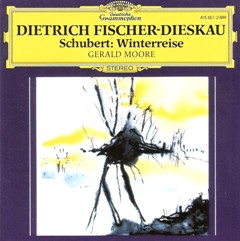111 Years of Deutsche Grammophon - CD 13
111 Years of Deutsche Grammophon - CD 13
Schubert: Winterreise

1 1. Gute Nacht [5:22] 2 2. Die Wetterfahne [1:47] 3 3. Gefrorne Tränen [2:18] 4 4. Erstarrung [3:00] 5 5. Der Lindenbaum [4:37] 6 6. Wasserflut [4:14] 7 7. Auf dem Flusse [3:27] 8 8. Rückblick [2:19] 9 9. Irrlicht [2:31] 10 10. Rast [2:54] 11 11. Frühlingstraum [3:52] 12 12. Einsamkeit [2:38] 13 13. Die Post [2:17] 14 14. Der greise Kopf [2:56] 15 15. Die Krähe [2:01] 16 16. Letzte Hoffnung [2:13] 17 17. Im Dorfe [3:38] 18 18. Der stürmische Morgen [0:53] 19 19. Täuschung [1:31] 20 20. Der Wegweiser [3:55] 21 21. Das Wirtshaus [4:08] 22 22. Mut [1:24] 23 23. Die Nebensonnen [2:43] 24 24. Der Leiermann [3:33] Dietrich Fischer-Dieskau - baritone Gerald Moore – piano
Winterreise (Winter Journey) is a song cycle for voice and piano by Franz Schubert (D. 911, published as Op. 89 in 1828), a setting of 24 poems by Wilhelm Müller.
Winterreise was composed in two parts, each containing twelve songs, the first part in February 1827 and the second in October 1827. The two parts were also published separately, by Tobias Haslinger, the first on 14 January 1828, and the second (the proofs of which Schubert was still correcting days before his death on 19 November) on 30 December 1828. Müller, a poet, soldier, and Imperial Librarian at Dessau in Prussia (present-day east-central Germany), died in 1827 aged 33, and probably never heard the first setting of his poems in Die schöne Müllerin (1823), let alone Winterreise. Vogl, a literary and philosophical man accomplished in the classics and the English language, came to regard Schubert's songs as 'truly divine inspirations, the utterance of a musical clairvoyance.' Schubert found the first twelve poems under the title Wanderlieder von Wilhelm Müller. Die Winterreise. In 12 Liedern in an almanack (Urania. Taschenbuch auf das Jahr 1823) published in Leipzig in 1823. It was after he had set these, in February 1827, that he discovered the full series of poems in Müller's book of 1824 entitled Poems from the posthumous papers of a travelling horn-player, dedicated to the composer Carl Maria von Weber (godfather of Müller's son F. Max Müller), 'as a pledge of his friendship and admiration'. Weber had died in 1826. On 4 March 1827, Schubert invited a group of friends to his lodgings intending to sing the first group of songs, but he was out when they arrived, and the event was postponed until later in the year, when the full performance was given.
Between the 1823 and 1824 editions Müller varied the texts slightly, but also (with the addition of the further 12 poems) altered the order in which they were presented. Owing to the two stages of composition, Schubert's order in the song-cycle preserves the integrity of the cycle of the first twelve poems published and appends the twelve new poems as a Fortsetzung (Continuation), following Müller's order (if one excludes the poems already set) with the one exception of switching "Die Nebensonnen" and "Mut!". In the complete book edition Müller's final running-order was as follows: Gute Nacht; Die Wetterfahne; Gefror'ne Thränen; Erstarrung; Der Lindenbaum; Die Post; Wasserfluth; Auf dem Flusse; Rückblick; Der greise Kopf; Die Krähe; Letzte Hoffnung; Im Dorfe; Der stürmische Morgen ; Täuschung; Der Wegweiser; Das Wirthshaus; [Das] Irrlicht; Rast; Die Nebensonnen; Frühlingstraum; Einsamkeit; Mut!; Der Leiermann. Thus Schubert's numbers would run 1-5, 13, 6-8, 14-21, 9-10, 23, 11-12, 22, 24, a sequence occasionally attempted by Hans Joachim Moser and Günther Baum.
Schubert's original group of settings therefore closed with the dramatic cadence of "Irrlicht", "Rast", "Frühlingstraum" and "Einsamkeit", and his second sequence begins with "Die Post". Dramatically the first half is the sequence from the leaving of the beloved's house, and the second half the torments of reawakening hope and the path to resignation.
In Winterreise Schubert raises the importance of the pianist to a role equal to that of the singer. In particular the piano's rhythms constantly express the moods of the poet, like the distinctive rhythm of "Auf dem Flusse", the restless syncopated figures in "Rückblick", the dramatic tremolos in "Einsamkeit", the glimmering clusters of notes in "Irrlicht", or the sharp accents in "Der stürmische Morgen". The piano supplies rich effects in the Nature imagery of the poems, the voices of the elements, the creatures and active objects, the rushing storm, the crying wind, the water under the ice, birds singing, ravens croaking, dogs baying, the rusty weathervane grating, the posthorn calling, and the drone and repeated melody of the hurdy-gurdy.








